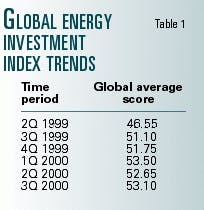GEI Index: OECD improving, emerging economies static
The average energy performance indicators for 20 countries that are monitored in the Global Energy Investment (GEI) Index remained relatively constant in third quarter 2000.
Although many individual country scores varied from earlier reports, the average score reported for all countries in the study (Table 1) differed little from those reported in first and second quarters 2000 (OGJ, Dec. 4, 2000, p. 28).
With the exception of Japan, the Organization for Economic Cooperation and Development country ratings generally improved. Oil and gas production declines and falling oil consumption led decreases in the index.
US oil consumption increased 600,000 b/d in the third quarter and, combined with private power plant gains, increased the US score to 79 points from 76. Australia slipped to 72 from 75 in the index, based on falling oil and gas production volumes. Gains in gas contracting volumes were evident in Chile and Germany.
Overall, 8 of the 10 higher-ranked countries moved up in the index. Of the 10 lower-ranked countries, however, 8 remained flat, and 1 decreased. Only China improved, although it continued to be last among the 20 countries.
The index
Each quarter, beginning in second quarter 1999, the GEI Index has tracked and evaluated a select group of countries for energy activities and market situation (for criteria and characteristics of the evaluation, see OGJ, Oct. 11, 1999, p. 42).
Factors impacting the evaluation include financial and economic indicators, energy production and use, and energy market liberalization and privatization measures. Changes in the index indicate developments in the climate for energy investments and market activities.
Global rankings such as the GEI Index reveal advances or reversals of financial, economic, and energy market conditions.
Latest results
A comparison of third quarter 2000 survey results and second quarter 2000 results are shown in Table 2.
In Europe, the UK's GEI ranking increased to 76 from 74 due to gas and electric power contracting gains. Spain moved up to 60 from 59 based on more private power and gas assets development. France stayed flat-with a score of 40 points-and Italy held flat at 47, while Norway plateaued at 64 points.
In Asia, Japan remained constant at 48 points. South Korea held steady at 34 points, as did the Philippines at 37 points. Because of higher Chinese gas production volumes, China increased to 27 points in the index from 26, the only country in the lower-ranking countries to move upward. India, however, dropped to 32 points from 33 the previous quarter due to its decreased oil use.
In the Americas, Argentina moved up to 61 points from 60 based on higher oil use. Chile rose to 70 points from 68 based on increasing gas and power contracting activities, and Brazil increased to 52 from 51 in the index, as oil production gains offset oil use declines.
This marks the final report in a series of six quarterly reports on the Global Energy Investment Index.


